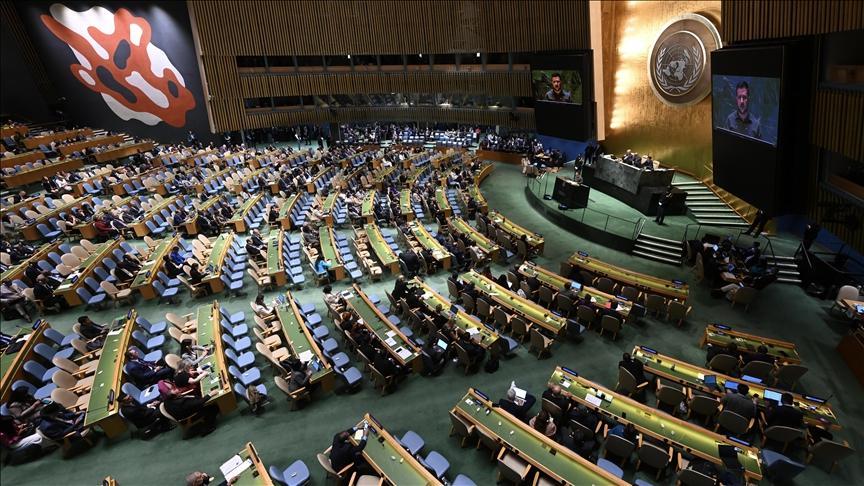*Writing by Esra Tekin in Istanbul
Africa-Press – Malawi. Annually, during the UN General Assembly in New York City, which gathers more than 190 global leaders, numerous significant decisions have been made since 1945, and from time to time, intriguing and extraordinary events have also taken place.
During the discussions, there are instances where statements causing debates are made, and at other times, speeches that should last for 15 minutes end up extending for hours.
Anadolu has gathered interesting and controversial parts of the 78-year UN General Assembly meetings.
Longest speech record belongs to Cuba’s Castro
Even if the speeches at the UN General Assembly are supposed to last a maximum of 15 minutes, the speakers’ time is usually not intervened with. Thus, some speakers in the General Assembly speak for hours rather than minutes.
On Sept. 26, 1960, Fidel Castro, who spoke at the assembly for approximately four-and-a-half hours (269 minutes) left his mark on history by saying: “If (the then US presidential candidate John F.) Kennedy were not an ignorant and illiterate millionaire, he would realize it is not possible to carry out a revolution against peasants in the mountains with the support of large landholders.”
Hugo Chavez compared former US President Bush with ‘devil’
Throughout its 78-year history, the General Assembly witnessed numerous intense discussions where leaders employed a spectrum of language, encompassing insults and accusations directed at fellow world leaders.
Venezuela’s former President Hugo Chavez drew a comparison between former US President George W. Bush and sulfur, a substance linked to the devil in the Bible. In his 2006 address at the assembly, Chavez remarked: “Yesterday, the devil came here. The scent of sulfur lingers even today.”
This statement marked one of the memorable recorded moments. Chavez subsequently commented during the tenure of Bush’s successor, Barack Obama, that the lectern no longer had the “sulfur scent.”
When Nicaraguan President Daniel Ortega, in his speech, accused the US of financially backing insurgents in Latin America and supporting the dictatorship of Anastasio Somoza Debayle in Nicaragua, the US delegation walked out of the chamber in 1987.
“Nicaraguan people may have to sit and listen to him, but I don’t,” said Vernon Walters, who was then the US ambassador to the UN.
Memorable speeches
Muammar Gaddafi’s speech at the UN General Assembly, which lasted roughly 100 minutes, was marked by impactful statements that left a lasting impression, along with occasional slip-ups. It stands out as one of the memorable moments in the history of the UN General Assembly.
“This should not be called a Security Council, it should be called a Terror Council,” Gaddafi lashed out at the UN Security Council in September 2009.
The former president of Uganda, Idi Amin, committed a noteworthy error during his speech in 1972.
While initially praising former UK Prime Minister Edward Heath, he inadvertently drew a controversial comparison between Heath and Adolf Hitler.
“I intended to say Winston Churchill, not Hitler. Heath resembles Churchill,” Amin promptly corrected his statement.
Icelandic gavel
In 1952, Iceland’s presentation of a gavel to the President of the UN General Assembly, which was used to inaugurate and adjourn sessions, endorse the agenda and cast votes on resolutions, transformed the gavel into an emblematic representation of the General Assembly.
However, an unintended mishap occurred in 1960 when the Icelandic gift broke while Irish diplomat Frederick Boland was attempting to mediate a dispute involving former Soviet Union President Nikita Khrushchev.
Following this incident, a new gavel was requested from Iceland but it went missing in 2005, necessitating the procurement of a replacement.
Brazil’s honor
Each year, despite not being a host nation or a permanent member of the UN Security Council, Brazil assumes the honor of delivering the first speech that launches the high-level meetings of the UN General Assembly.
Former UN Chief of Protocol Desmond Parker elucidated the rationale behind this tradition that has persisted since the 10th UN General Assembly in 1955.
“In the earlier days, when no one was eager to take the lead in delivering the first speech, Brazil consistently volunteered to be the first speaker. As a result, Brazil secured the privilege of inaugurating the General Assembly,” he explained.
Parker also highlighted that once the list of speakers is opened, the country that acts swiftly to register its name gains a speaking position, saying: “The early bird gets the worm.”
The speaking order in the General Assembly is not organized alphabetically.
Following Brazil, the host country, the US, takes the floor, followed by other member states based on factors such as representation level, the timing of their request to speak, and geographic balance.
Unconventional seating arrangement
The General Assembly employs a distinctive rule for seating arrangements. The secretary-general randomly selects the name of a member state from a hat containing the names of all member states.
The selected country is allotted the first seat on the right, and the seating arrangement proceeds alphabetically from there.
Parker clarified that this practice aims to prevent any one country from occupying the same seat year after year, ensuring fairness and equitable distribution.
Parker mentioned that due to the large number of leaders and delegations participating in the meetings, hosting a formal welcome ceremony is impractical. Instead, one or two officials from the Protocol and Liaison Service extend greetings to the heads of state and government.
Notable events, anecdotes
In 1965, Indonesia made history by becoming the first and only country to submit a letter of intent to withdraw from the UN following a dispute with Malaysia.
In 2018, a unique guest attended the General Assembly – the 3-month-old infant of then New Zealand Prime Minister Jacinda Ardern.
In response to the COVID-19 pandemic, the UN General Assembly held its first-ever online session in 2020.
During the 78th session of the UN General Assembly this year, Turkish President Recep Tayyip Erdogan delivered his address on the first day, saying levels of racism, xenophobia and Islamophobia have all climbed to a dangerous breaking point.
The session has drawn high-level participation from 190 countries and will continue from Sept. 19 to 26.
For More News And Analysis About Malawi Follow Africa-Press






